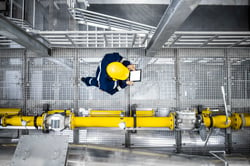Overview
A Facilities Engineer plays a critical role in the design, maintenance, and optimization of infrastructure systems within industrial plants, particularly in the oil and gas sector. Their primary responsibilities revolve around ensuring that facilities operate efficiently and safely. They manage engineering tasks related to the construction, operation, and maintenance of equipment, as well as compliance with regulatory standards.
Facilities Engineers work in a variety of environments, including oil and gas plants, manufacturing sites, and chemical processing facilities. They ensure that plant operations are smooth and productive, identifying and solving problems that arise in infrastructure systems.
Daily Tasks
The facilities engineer job description encompasses a variety of tasks including:
Facility Design and Engineering Review:
Overseeing engineering work to ensure that it complies with company specifications and industry standards.
Reviewing designs provided by contractors and sub-contractors to guarantee alignment with operational goals.
Risk Management:
Participating in risk assessments and safety evaluations, such as Hazard and Operability Studies (HAZOP) and Critical Operating Parameter Reviews.
Leading incident investigations, especially those related to safety and process downtime.
Operations Support:
Acting as the point of contact for specific plant areas, providing operational support.
Conducting regular facilities surveillance and performance assessments.
Project and Opportunity Management:
Identifying improvement opportunities within the facility and developing scopes of work for potential projects.
Assisting in plant shutdowns, ensuring smooth coordination during equipment maintenance or repairs.
Mentorship and Leadership:
Coaching and mentoring junior engineers or colleagues, sharing expertise, and fostering a collaborative work environment.
Work Settings
Locations:
Corporate Headquarters:
Facilities Engineers may work at a company's headquarters, managing coordination between plant operations and corporate policies. They provide technical oversight and support for multiple facilities.
On-Site at Plants:
Facilities Engineers often spend time on-site at oil, gas, or chemical plants. They oversee maintenance and equipment integrity. They are involved in fieldwork, collaborating with other engineers and operations personnel to ensure the smooth running of plant equipment.
Types of Companies
Oil and Gas Companies:
Respected conventional energy giants employ Facilities Engineers to maintain and optimize the infrastructure used in refining and extraction processes.
Engineering Consultancies:
Some Facilities Engineers work for engineering firms that offer consultancy services to companies needing expertise in plant design, maintenance, and upgrades.
Common Responsibilities
Technical Responsibilities:
Equipment Design and Inspection:
Ensuring that all plant equipment, such as piping and pressure vessels, meet design standards and operational requirements.
Process Safety:
Ensuring the safe operation of facilities by conducting risk assessments, identifying hazards, and leading investigations of safety incidents.
Surveillance:
Monitoring key performance indicators (KPIs) of assigned areas within the plant, identifying potential problems, and implementing corrective actions.
Managerial and Strategic Responsibilities:
Project Management:
Managing timelines, budgets, and resources for various plant projects. This includes ensuring that milestones are achieved and that projects remain on schedule.
Team Leadership:
Leading and mentoring junior engineers, offering guidance and development opportunities.
Collaboration and Communication:
Inter-Departmental Coordination:
Working closely with cross-functional teams, including contractors, regulatory bodies, and other engineering departments to ensure facility operations meet standards.
Documentation:
Keeping accurate records of engineering designs, testing procedures, and operational adjustments for future reference and compliance.
Common Qualifications
Educational Background:
Bachelor’s Degree:
A degree in Chemical, Civil, Mechanical, or Electrical Engineering is required for most Facilities Engineer roles. This provides a solid foundation in the principles of engineering.
Professional Experience:
Many employers look for candidates with substantial industry experience, ideally within oil, gas, or chemical plant operations. Experience in risk assessment and project management is highly valued.
Skills:
Technical Expertise:
Strong understanding of design standards, safety regulations, and equipment integrity protocols.
Communication Skills:
Ability to communicate effectively with colleagues, contractors, and regulatory bodies, especially in explaining technical details.
Project Management:
Excellent organizational skills, with the ability to manage multiple projects and meet deadlines.
Leadership:
Experience mentoring junior engineers and leading project teams.
Experience:
Entry-Level:
Typically, facilities engineers begin with 1-3 years of experience, often as part of an engineering team or through internships in related fields like oil and gas, manufacturing, or chemical plants.
Mid-Level (Facilities Engineer II):
Employers usually require 4-6 years of experience in facilities management, operations, or related engineering fields, with a proven ability to handle operational support and risk assessments.
Senior-Level (Facilities Engineer III):
7-10+ years of experience, including expertise in leading incident investigations, risk assessments, and project management, is often necessary. Leadership experience in mentoring junior engineers or managing cross-functional teams is expected at this level.
Compensation
The pay for a Facilities Engineer can vary depending on location, experience, and the size of the company. Facilities engineer salary and contract pay also vary as follows:
Average contract pay: $80- $120 per hour
Average salary: $80,000 to $130,000 annually
Pay in the oil and gas sector tends to be competitive, especially in high-demand locations such as the Gulf Coast where these roles are often based.
Brunel is looking for mid-to-senior-level Facilities Engineers for a variety of projects. Apply now for facilities engineer vacancies or send us your resume for consideration.
Summary
A career as a Facilities Engineer offers a challenging and rewarding opportunity to ensure the efficient and safe operation of industrial plants, particularly in oil, gas, and chemical sectors. Facilities Engineers play a vital role in managing infrastructure, overseeing equipment integrity, and ensuring compliance with safety and regulatory standards. The role involves a combination of technical expertise, risk management, and leadership, making it ideal for individuals who thrive in dynamic and complex industrial environments.
With opportunities for career growth and competitive compensation, Facilities Engineers can have a significant impact on plant operations and safety, along with a stable career trajectory. They are key contributors to optimizing plant performance, minimizing downtime, and ensuring that facilities run smoothly.




